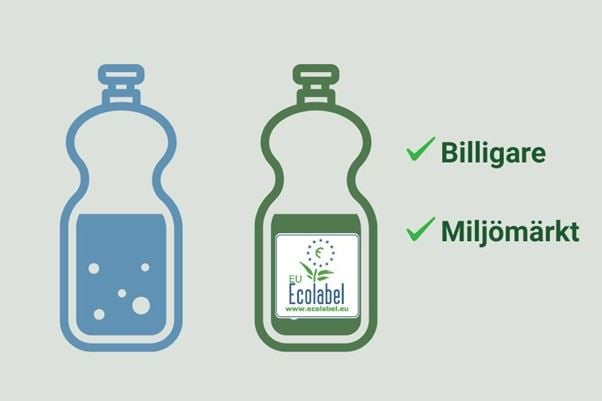New European study: Ecolabelled products affordable – or cheaper
It is time to bust the myth that ecolabelled products are more expensive. A new comprehensive price study from France shows that ecolabelled products with the EU Ecolabel have about the same or lower price as non-ecolabelled products. This sends an important signal to both public and private purchasers and consumers.

The study includes 413 products tested between 2020 and 2024. The result is clear: ecolabelled products are fully competitive in price and thus accessible to consumers, purchasers and public actors alike. The result is transferable to Swedish conditions.
– It's time to bust the myth that it's more expensive to choose the right one for the environment! Buying ecolabelled products is not only a way to reduce the environmental impact – it is also a financially wise choice. The study shows that we don't have to choose between the planet and our wallets, says Lena Mårdh, project manager for public procurement at Ecolabelling Sweden.

82 percent of tests show the same or lower price
The study analyzed the prices of dishwashing and detergents, detergents, shower gel, diapers, menstrual products, paint, and more. In 82 per cent, the EU Ecolabelled products were at the same price level or lower than the other products in the tests.
A recurring argument against ecolabelled products is that they would be more expensive. But the study shows the opposite:
- 18 tests showed a non-significant difference of 0.1 cents between EU-Ecolabelled products compared to non-ecolabelled products.
- Five tests showed cheaper prices for EU Ecolabelled products compared to non-ecolabelled products. For example: On average, liquid detergent with the EU Ecolabel cost 3.17 euros/litre, compared to 3.37 euros/litre for other products – a difference of 20 cents.
Public procurement is an engine for sustainable development
The public sector procures goods and services for more than SEK 900 billion every year in Sweden.
– Public procurement is an important engine in the green transition. When authorities, regions and municipalities choose ecolabelled products, they show that sustainability and economics can go hand in hand, says Lena Mårdh.
Facts about the study
- Published in 2025. Implemented by Adème, the French government's secretariat for the green transition. The study was based on audits by the French consumer authority INC and the French consumer organization UFC Que Choisir, between 2020 and 2024
- Number of tests: 28
- Number of products: 413, of which 96 have the EU Ecolabel
- Results: In 82% of cases, ecolabelled products had the same or lower price as non-ecolabelled products.
About the EU Ecolabel
Launched in 1992 by the European Commission, the EU Ecolabel is the only official ecolabel used in all EU Member States. The label makes it easy for consumers, companies and public actors to choose products and services that are better for both the environment and health. In Sweden, Ecolabelling Sweden is responsible for the EU Ecolabel and the Nordic Ecolabel. Both labels are Type 1 eco-labels according to ISO 14024 and imply independent control and a life cycle perspective in the requirements that are set.
Read more:
For more information:
- Lena Mårdh Project Manager Public Procurement +46 (0)8-55 55 24 48 lena.mardh@svanen.se
